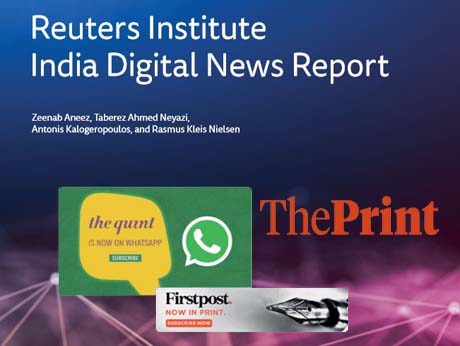
April 26 2019: India is a mobile-first news market with an overwhelming majority (68%) identifying their smartphones as their primary device for consuming news, markedly higher than similar globa l markets like Brazil and Turkey.
Audiences are largely accessing news via 'side-doors' such as search (32%) and social media (24%), rather than going directly to sources of news (18%).
These are findings from the first ever India Digital News Report 2019,published today by the Reuters Institute for the Study of Journalism which looks at news consumption patterns,trust in the news, media literacy and views on disinformation.
In the run-up to the country's elections,billed by some as the world's largest democratic exercise,many are concerned that expressing politicalviewpoints online could affect how friends or fam ily (49%) and colleagues or acquaintances (50%) see them, with a majority worried that doing so could find them in trouble with the authorities (55%). The report also finds overall trust in news (36%) is lower than other large, comparable markets such as Brazil and Turkey. A majority (57%) also express concerns over whether online news is real or fake, with many concerned with hyperpartisan content (51%), poor journalism (51%), as well as news that is false (50%).
-----------------------------------------------------------------------
Read the full 28 page PDF of the Reuter report here
-----------------------------------------------------------------------
The report captures some key trends in digital news consumption of India’s English-language news users with internet access. The study was made possible by support from The Hindu Media Group, the Indian Express, The Quint, and the Press Trust of India. In the past few years, India has seen explosive growth in Internet access, especially mobile, and subsequent increase in digital media consumption across the country. These developments have not only affected the news and entertainment landscape of the country but also impacted the nature of public debate in the country. These shifts have and will continue to have a significant impact on the practice of journalism, media organisations and thebusiness of news.
Further key findings from the study include:
Rasmus Kleis Nielsen, co-author of the report says: “Indians are rapidly embracing digital, mobile, and social media, and advertisers are bound to follow. This will be the end of the era in which Indian news media could expect advertising to more or less alone cover their costs, and means that it is critically important that Indian news media develop new, sustainable business models for online news. The alternative is structural decline, increased reliance on government advertising, or on subsidies from proprietors, all of which could undermine editorial independence and put professional journalism at risk.”
Adds co-author Taberez Ahmed-Neyazi : “This is a very important contribution to understand how English-speaking urban middle class use digital media for various purposes and how they engage with news and express themselves online. Given the massive growth in mobile Internet connections, more Indians are now online, which is going to have important implications for politics as political parties and leaders try to target them through their campaigns.”
The report is based on a study commissioned by the Reuters Institute for the Study of Journalism, and conducted by YouGov using an online questionnaire in early January 2019